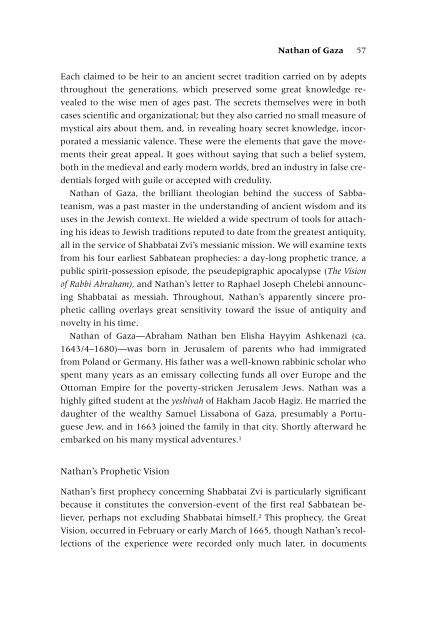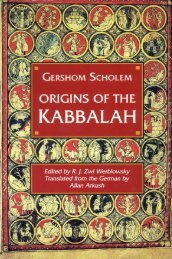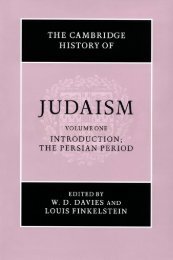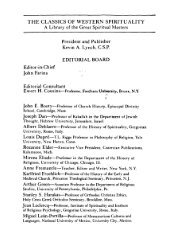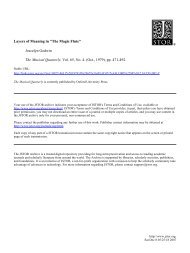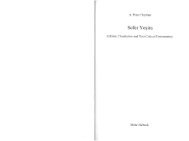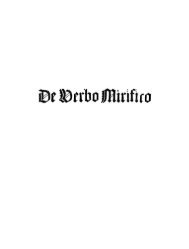Create successful ePaper yourself
Turn your PDF publications into a flip-book with our unique Google optimized e-Paper software.
Nathan of Gaza 57<br />
Each claimed to be heir to an ancient secret tradition carried on by adepts<br />
throughout the generations, which preserved some great knowledge revealed<br />
to the wise men of ages past. <strong>The</strong> secrets themselves were in both<br />
cases scientific and organizational; but they also carried no small measure of<br />
mystical airs about them, and, in revealing hoary secret knowledge, incorporated<br />
a messianic valence. <strong>The</strong>se were the elements that gave the movements<br />
their great appeal. It goes without saying that such a belief system,<br />
both in the medieval and early modern worlds, bred an industry in false credentials<br />
forged with guile or accepted with credulity.<br />
Nathan of Gaza, the brilliant theologian behind the success of <strong>Sabbatean</strong>ism,<br />
was a past master in the understanding of ancient wisdom and its<br />
uses in the Jewish context. He wielded a wide spectrum of tools for attaching<br />
his ideas to Jewish traditions reputed to date from the greatest antiquity,<br />
all in the service of Shabbatai Zvi’s messianic mission. We will examine texts<br />
from his four earliest <strong>Sabbatean</strong> prophecies: a day-long prophetic trance, a<br />
public spirit-possession episode, the pseudepigraphic apocalypse (<strong>The</strong> Vision<br />
of Rabbi Abraham), and Nathan’s letter to Raphael Joseph Chelebi announcing<br />
Shabbatai as messiah. Throughout, Nathan’s apparently sincere prophetic<br />
calling overlays great sensitivity toward the issue of antiquity and<br />
novelty in his time.<br />
Nathan of Gaza—Abraham Nathan ben Elisha Hayyim Ashkenazi (ca.<br />
1643/4–1680)—was born in Jerusalem of parents who had immigrated<br />
from Poland or Germany. His father was a well-known rabbinic scholar who<br />
spent many years as an emissary collecting funds all over Europe and the<br />
Ottoman Empire for the poverty-stricken Jerusalem Jews. Nathan was a<br />
highly gifted student at the yeshivah of Hakham Jacob Hagiz. He married the<br />
daughter of the wealthy Samuel Lissabona of Gaza, presumably a Portuguese<br />
Jew, and in 1663 joined the family in that city. Shortly afterward he<br />
embarked on his many mystical adventures. 1<br />
Nathan’s Prophetic Vision<br />
Nathan’s first prophecy concerning Shabbatai Zvi is particularly significant<br />
because it constitutes the conversion-event of the first real <strong>Sabbatean</strong> believer,<br />
perhaps not excluding Shabbatai himself. 2 This prophecy, the Great<br />
Vision, occurred in February or early March of 1665, though Nathan’s recollections<br />
of the experience were recorded only much later, in documents


